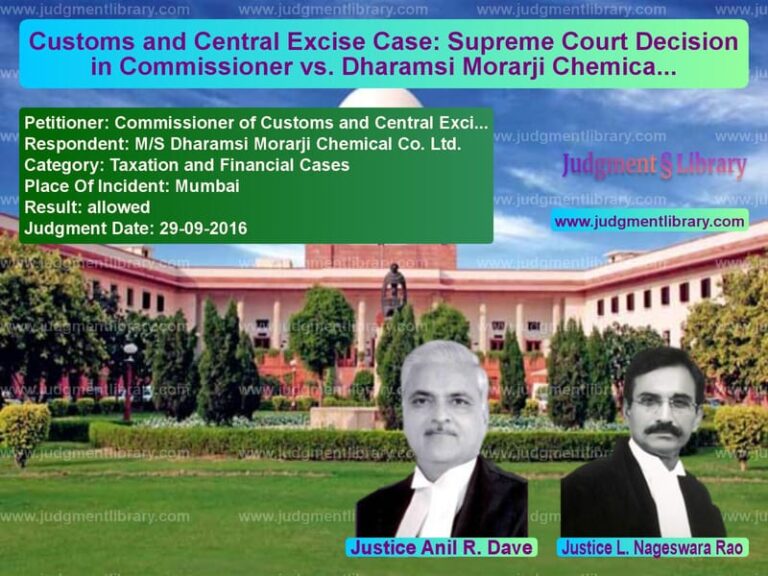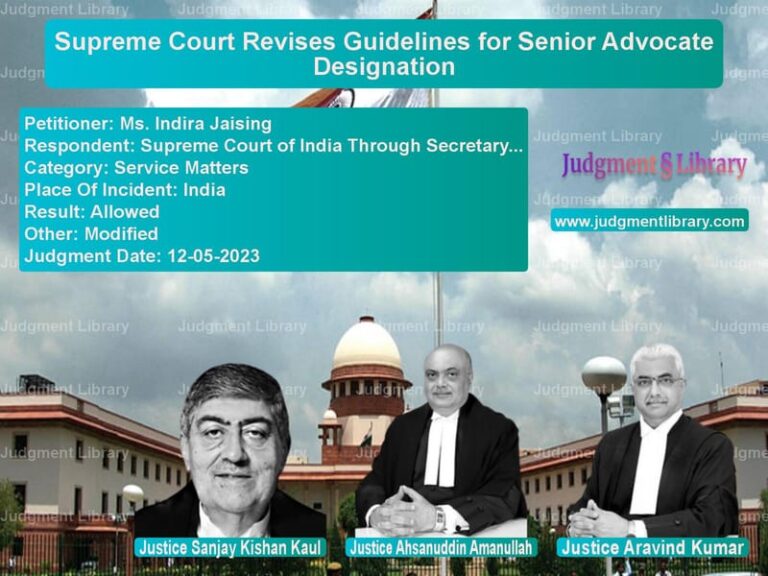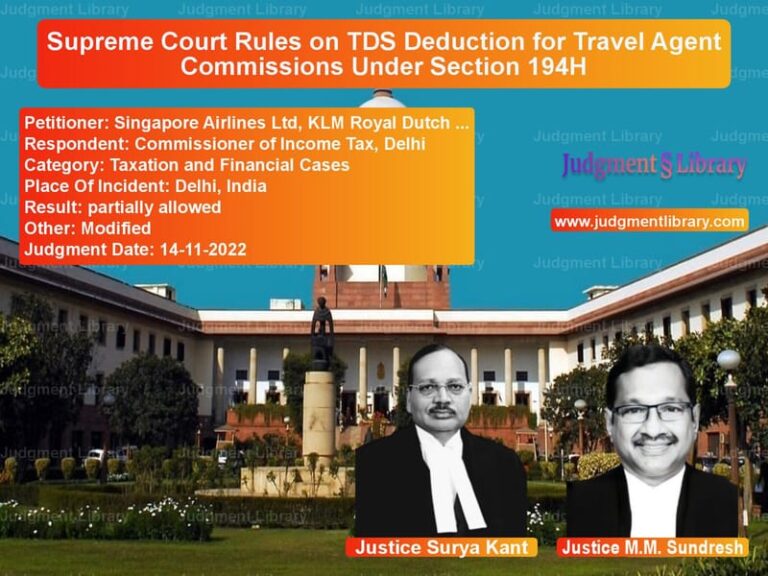Supreme Court Allows State Governments to Regulate Liquor Sales Near Highways
The Supreme Court of India, in its judgment in State of Tamil Nadu vs. K. Balu & Anr., addressed a significant issue regarding the regulation of liquor sales along highways. The ruling clarified the application of a previous order restricting liquor sales near highways and permitted state governments to determine whether similar principles should apply to areas governed by local self-governing bodies.
Background of the Case
The case originated from a series of orders passed by the Supreme Court, beginning with its landmark judgment on December 15, 2016, in which the Court prohibited the sale of liquor along national and state highways. The restriction aimed to reduce road accidents and enhance public safety.
Following this, the Court issued additional clarifications on March 31, 2017, and July 11, 2017, particularly in the case of Arrive Safe Society of Chandigarh vs. Union Territory of Chandigarh. The July 11 order clarified that the restriction did not apply to licensed establishments within municipal areas, as their proximity to highways was not the primary concern.
The present matter arose when multiple applications (MAs/IAs) were filed, seeking further clarifications on whether similar exemptions could apply to areas under local self-governing bodies and statutory development authorities.
Key Legal Issues Considered
- Whether the term ‘municipal areas’ as used in the July 11, 2017, order should include areas governed by local self-government bodies.
- Whether state governments have the authority to determine the applicability of liquor sale restrictions to specific areas.
- Whether extending the exemption beyond municipal areas would be consistent with the intent of the Court’s original order.
Arguments by the Petitioners (State Governments)
- The term ‘municipal areas’ should not be narrowly interpreted to exclude local self-governing bodies and developed statutory zones.
- Many areas under local self-government are similar to municipalities in terms of development and urbanization.
- The Court should grant state governments the authority to determine which areas should be exempt from the highway liquor ban.
Arguments by the Respondents (Intervenors Opposing Relaxation)
- The applications for clarification amount to a review of the Court’s previous orders and are therefore not maintainable.
- The restriction on liquor sales near highways was intended to improve road safety, and expanding exemptions could dilute its effectiveness.
- The distinction between municipal areas and other jurisdictions should be maintained to uphold the original intent of the prohibition.
Supreme Court’s Observations
The Supreme Court clarified that its earlier orders were intended to address liquor sales in proximity to highways to reduce drunk-driving incidents. However, the Court recognized that certain areas governed by local bodies might be similarly developed as municipal areas.
The Court stated:
“The purpose of the directions contained in the order dated 15 December 2016 is to deal with the sale of liquor along and in proximity of highways properly understood, which provide connectivity between cities, towns, and villages. The order does not prohibit licensed establishments within municipal areas.”
The Court further emphasized:
“The use of the expression ‘municipal areas’ in the order dated 11 July 2017 does not prevent the state governments from making a determination as to whether the same principle should apply to local self-governing bodies and statutory development authorities.”
Final Judgment and Directions
- The Supreme Court allowed state governments to decide whether areas governed by local self-governing bodies and statutory development authorities should be treated the same as municipal areas for liquor sale regulations.
- State governments were directed to consider relevant factors such as urban development and proximity to municipal agglomerations when making these determinations.
- The Court left it open to individual liquor license holders to submit representations to their respective state governments for consideration.
- The ruling aimed to prevent unnecessary litigation by enabling state authorities to make decisions based on local conditions.
Implications of the Judgment
This ruling has significant implications for state liquor regulations and highway safety policies:
- Increased State Autonomy: State governments now have greater discretion in determining where the liquor sale restrictions should apply.
- Balancing Public Safety and Economic Interests: While maintaining road safety concerns, the judgment acknowledges the economic impact on businesses.
- Reduction in Legal Uncertainty: The ruling helps prevent multiple litigations by clarifying that states have the authority to regulate liquor sales in non-municipal urban areas.
- Encouragement for Local Policy Formulation: The decision allows state governments to develop policies based on regional needs rather than a blanket prohibition.
Conclusion
The Supreme Court’s ruling in this case provides much-needed clarity on liquor sale regulations near highways. By allowing state governments to determine the applicability of restrictions, the Court has ensured a flexible approach that considers both safety concerns and local governance needs. The judgment strikes a balance between preventing drunk driving and enabling economic activity in developed non-municipal areas.
Petitioner Name: State of Tamil NaduRespondent Name: K. Balu & Anr.Judgment By: Justice Dipak Misra, Justice Amitava Roy, Justice D.Y. ChandrachudJudgment Date: 23-02-2018
Don’t miss out on the full details! Download the complete judgment in PDF format below and gain valuable insights instantly!
Download Judgment: State of Tamil Nadu vs K. Balu & Anr. Supreme Court of India Judgment Dated 23-02-2018.pdf
Direct Downlaod Judgment: Direct downlaod this Judgment
See all petitions in Legislative Powers
See all petitions in Public Interest Litigation
See all petitions in Fundamental Rights
See all petitions in Judgment by Dipak Misra
See all petitions in Judgment by Amitava Roy
See all petitions in Judgment by Dhananjaya Y Chandrachud
See all petitions in allowed
See all petitions in Modified
See all petitions in supreme court of India judgments February 2018
See all petitions in 2018 judgments
See all posts in Constitutional Cases Category
See all allowed petitions in Constitutional Cases Category
See all Dismissed petitions in Constitutional Cases Category
See all partially allowed petitions in Constitutional Cases Category







